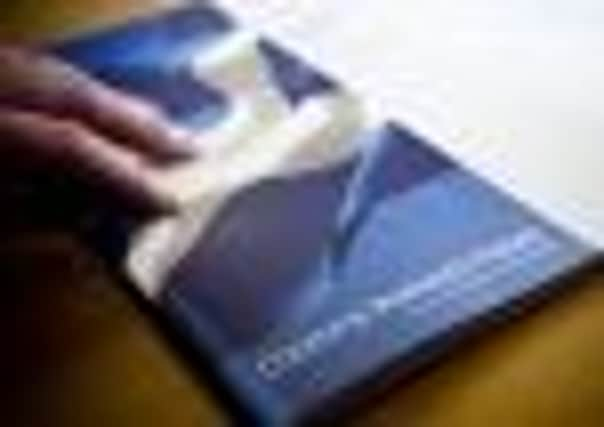Leaders: Referendum consultation process no place for anonymity


It is absolutely right that there should be a widespread public consultation on how and when this vote might take place. But just as the referendum vote itself should be free, open and transparent so that there can be no room for argument about how the people have voted, so too must the consultation now taking place follow the same rules.
It appears that this may not be the case. It has emerged that anonymous submissions are being permitted. It could be argued that all votes in the referendum itself will be anonymous, so there is nothing wrong with putting a point of view on the conduct of the plebiscite in similar fashion. Such an argument is specious. Votes at elections are superficially anonymous, but the identity of the person who cast each ballot can be checked should there be allegations of fraud. According to Bruce Crawford, the parliament minister, submitted opinions will be treated as valid even if no information about the identity of the writer is received.
Advertisement
Hide AdAdvertisement
Hide AdThere is a case for allowing anonymity. Many people who work for companies or organisations which have publicly voiced an opinion, may feel inhibited about submitting views. If they work for a company which has urged holding the referendum sooner than the Scottish Government’s preferred date, but they feel it should be held later, then they may feel inhibited about expressing that view if it will be made public. The obvious answer is for such a person to submit a request for anonymity, but also to submit a full declaration of who they are. This would be kept secret, but should be available for inspection by a body such as the Electoral Commission.
However, Mr Crawford says such a declaration is not necessary. This is not just outrageous, but as Alan Trench, an academic expert on devolution says, it is also dangerous. One set of people with a particular viewpoint may submit multiple versions of that opinion, skewing the eventual outcome. The opposition parties assume that such a tactic will be taken up by nationalist supporters resulting in the findings that Alex Salmond wants to hear.
That would be unacceptable, but it is also open to unionists to do the same thing. This would turn the referendum consultation into a political contest in which each camp tries to send in as many opinions as possible. While it is possible to detect multiple copies of the same opinion, it is also possible for people to compose different versions of the same argument. The Scottish Government must announce that anonymous submissions unaccompanied by a verifiable identity declaration will be rejected. Otherwise a flawed consultation may mean that the referendum itself is viewed as rigged even before a vote has been cast, invalidating the outcome, especially if the result is close.
Supreme Court rules fairer balance of power
Environmental campaigners this week have cause to celebrate the name of Penelope Uprichard and to toast the UK Supreme Court. The court has made a judgment in favour of Ms Uprichard which carries the implication that the financial dice which have been loaded against campaigners seeking to challenge big development plans by big companies, local authorities or even the Scottish Government, are now more balanced.
Ms Uprichard lost challenges in the Scottish courts against decisions by Fife Council permitting substantial developments of housing and businesses to the west of St Andrews. It left her facing not only a bill for her own costs but also those of whom she challenged. The total of £173,000 is an intolerable burden for any individual who wants to challenge those in power but much less so for any public body or company with much deeper pockets.
The Supreme Court evidently agrees with her, and has granted a Protective Costs Order limiting the amount that her opponents can claim from her to £3,000. She still has her own bills to pay, but her total liability, she estimates, has been reduced to a more manageable £50,000.
Whether this order makes planning permission harder to obtain for economically important but environmentally questionable projects, such as the Beauly-Denny power line upgrade or the Aberdeen western by-pass, both of which have been stalled by years of environmental objections, remains to be seen. But in the meantime, the Supreme Court has given ordinary people greater power to challenge big companies and the planning decisions of councils.
Lonely arts club without the John who matters
It is the classic cover of a classic album. The Beatles revolutionary Sgt Pepper’s Lonely Hearts Club Band changed the world of popular music forever but part of the impact of “Pepper” came from Peter Blake’s art work.
Advertisement
Hide AdAdvertisement
Hide AdFor the original, the group chose people they admired, so Marilyn Monroe, Bob Dylan, Marlon Brando, Karl Marx, Marlene Dietrich, Stan Laurel and Oliver Hardy featured, along with the fab four themselves in the foreground.
Now Sir Peter, as he is now, has put together a new version featuring people who inspired him, including Alexander McQueen, Amy Winehouse, Damien Hirst, Tracey Emin and David Hockney. Slightly bizarrely Fanny Cradock and Delia Smith appear with JK Rowling.
A interesting and eclectic mix, as you would expect from the father of pop art. Sir Peter has also selected his fellow knights Paul McCartney and Mick Jagger but keen observers of the new design, to go on display for his 80th birthday this year, will notice someone missing.
Actor John Hurt and the late DJ John Peel are there but one John is missing. What about Lennon, the other half of the song-writing team which made the Beatles the phenomenon they were, and still are? He should be there.